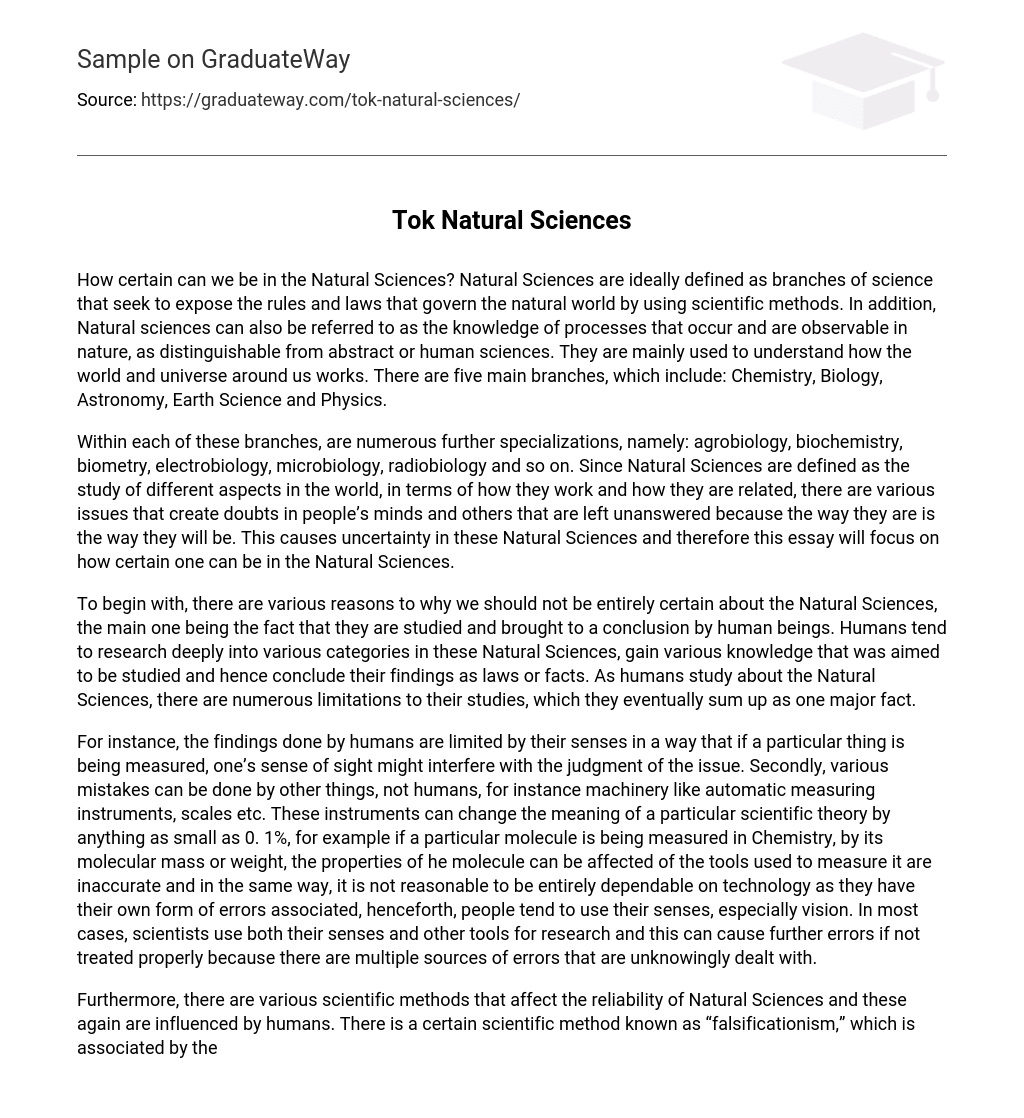How certain can we be in the Natural Sciences? Natural Sciences are ideally defined as branches of science that seek to expose the rules and laws that govern the natural world by using scientific methods. In addition, Natural sciences can also be referred to as the knowledge of processes that occur and are observable in nature, as distinguishable from abstract or human sciences. They are mainly used to understand how the world and universe around us works. There are five main branches, which include: Chemistry, Biology, Astronomy, Earth Science and Physics.
Within each of these branches, are numerous further specializations, namely: agrobiology, biochemistry, biometry, electrobiology, microbiology, radiobiology and so on. Since Natural Sciences are defined as the study of different aspects in the world, in terms of how they work and how they are related, there are various issues that create doubts in people’s minds and others that are left unanswered because the way they are is the way they will be. This causes uncertainty in these Natural Sciences and therefore this essay will focus on how certain one can be in the Natural Sciences.
To begin with, there are various reasons to why we should not be entirely certain about the Natural Sciences, the main one being the fact that they are studied and brought to a conclusion by human beings. Humans tend to research deeply into various categories in these Natural Sciences, gain various knowledge that was aimed to be studied and hence conclude their findings as laws or facts. As humans study about the Natural Sciences, there are numerous limitations to their studies, which they eventually sum up as one major fact.
For instance, the findings done by humans are limited by their senses in a way that if a particular thing is being measured, one’s sense of sight might interfere with the judgment of the issue. Secondly, various mistakes can be done by other things, not humans, for instance machinery like automatic measuring instruments, scales etc. These instruments can change the meaning of a particular scientific theory by anything as small as 0. 1%, for example if a particular molecule is being measured in Chemistry, by its molecular mass or weight, the properties of he molecule can be affected of the tools used to measure it are inaccurate and in the same way, it is not reasonable to be entirely dependable on technology as they have their own form of errors associated, henceforth, people tend to use their senses, especially vision. In most cases, scientists use both their senses and other tools for research and this can cause further errors if not treated properly because there are multiple sources of errors that are unknowingly dealt with.
Furthermore, there are various scientific methods that affect the reliability of Natural Sciences and these again are influenced by humans. There is a certain scientific method known as “falsificationism,” which is associated by the name “Karl Popper”, whereby he suggests that scientists do not begin by making scientific observations, but they begin with an informed theory based on previous ones which enables them to formulate a hypothesis.
Hypotheses are various predictions that are made before carrying out any scientific research or experiment and they are either proved right or wrong depending on the research. As a prediction is made, this can still be interfered by people’s perceptions and judgments in a way that they would think along the lines of their predictions and thus their senses will respond in that manner. This simply leads to inaccuracy as people tend to be more one-sided than open-minded.
On the other hand, there are also situations where Human Sciences can be relied on and we can be certain about the laws and predictions put into use. This is mainly because science is something that is evident in this world and it lives around us, therefore it is very hard to prove it wrong because various facts about science are simply existent and there is not scope for changing its meaning.
Therefore, as Natural Sciences are ‘natural,’ there is a lot of hope that doubts cannot easily occur as science is always around us. In the same way, Natural Sciences can be hypothesized; being proven by further evidence and the result is expected which is acquired by the use of formulae, experiments and data to be proved. On the whole, the certainty in natural sciences depends on numerous factors and aspects. However, as this is the twenty first century, it is a lot asier for one to be certain in the Natural sciences as the technological advancement has drastically eased research and finding in the Natural Sciences, which makes it reliable for the world. On the other hand, there might be some cases whereby it is not entirely possible for us, humans, to be certain in Natural sciences because most of the aspects in science are taken one step further by us and therefore there might be a lot of chances for errors which leads to various issues of whether Natural sciences are reliable or not.





